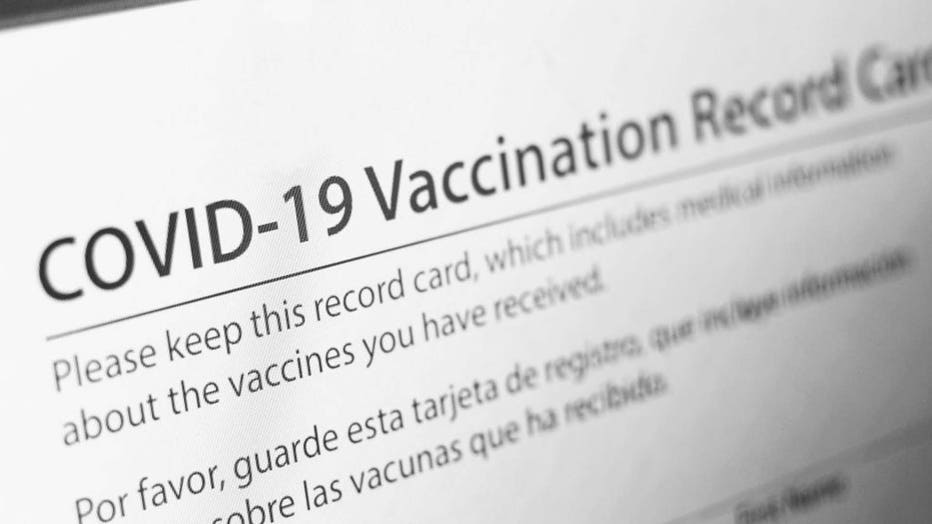HIPAA does not apply to revealing COVID-19 vaccine status at work, HHS says
WASHINGTON - The U.S. Department of Health and Human Services' Office for Civil Rights (OCR) said on Thursday that the Health Insurance Portability and Accountability Act of 1996 (HIPAA) Privacy Rule does not apply to employers or employment records.
That means companies are not infringing upon their employees’ legal privacy by asking them to reveal their COVID-19 vaccination status.
The OCR guidance aims to help "common workplace scenarios and answers questions about whether and how the HIPAA Privacy Rule applies. This information will be helpful to the public as we continue to navigate the COVID-19 pandemic," according to an HHS news release.
"We are issuing this guidance to help consumers, businesses, and health care entities understand when HIPAA applies to disclosures about COVID-19 vaccination status and to ensure that they have the information they need to make informed decisions about protecting themselves and others from COVID-19," said OCR Director Lisa Pino.

FILE - In this photo illustration the COVID-19 vaccination record card used in the United States.
RELATED: United Airlines to fire 593 employees who refused COVID-19 vaccine
Company-issued vaccine requirements amid an ongoing and deadly pandemic have been a point of contention for many workers, resulting in mass terminations, protests and employees leaving their jobs.
Some have argued that requiring workers to disclose their vaccination status goes against HIPAA, but that has been proven repeatedly to be false.
Margaret Riley, law professor at the University of Virginia, told FOX Business that "businesses are free to set whatever rules they like to protect their other customers and employees. A business that may have particularly vulnerable employees or customers may choose to apply stricter rules, including demanding proof of vaccination."
Businesses for months have been encouraging workers to get vaccinated, in some cases offering incentives like time off or gift cards. But more are taking a harder stance and requiring vaccinations for any remaining holdouts, a push that has gained momentum since Pfizer’s vaccine recently received full approval from the U.S. Food and Drug Administration.
RELATED: Can businesses ask about your COVID-19 vaccination status?
President Joe Biden announced sweeping federal vaccine requirements earlier this month, affecting as many as 100 million Americans in an all-out effort to increase COVID-19 vaccinations and curb the surging delta variant.
The expansive rules mandate that all employers with more than 100 workers require them to be vaccinated or test for the virus weekly, affecting about 80 million Americans. And the roughly 17 million workers at health facilities that receive federal Medicare or Medicaid also will have to be fully vaccinated.
Biden also signed an executive order to require vaccination for employees of the executive branch and contractors who do business with the federal government — with no option to test out. That covers several million more workers.
RELATED: These companies are requiring employees to get COVID-19 vaccinations
The requirement for large companies to mandate vaccinations or weekly testing for employees will be enacted through a forthcoming rule from the Occupational Safety and Health Administration that carries penalties of $14,000 per violation, an administration official said. The White House did not immediately say when it would take effect but said workers would have sufficient time to get vaccinated.
Employers "feel like they’ve sort of hit that point where the unvaccinated are not going to do it unless there’s something significant making them do it," said Wade Symons, a partner with Mercer, a benefits consultant.
It’s legal for businesses to require the shots, and they could fire employees who don’t comply. In other cases, workers might be required to wear masks or get regular tests for the virus. Some companies also are considering making the unvaccinated pay more for their health insurance.
At Delta Air Lines, unvaccinated employees on the company health plan will be charged $200 a month to help cover costs for possible COVID-19 hospital stays.
RELATED: Bill would require US airline passengers to have COVID-19 vaccine or prove negative test
United Airlines, meanwhile, said nearly half the employees who faced termination for refusing to get vaccinated against COVID-19 have gotten their shots.
That cuts the number of airline workers facing dismissal from 593 to 320. An airline spokeswoman Leslie Scott said the declining number of potential firings shows the company’s policy of requiring vaccinations is working.
"In less than 48 hours, the number of unvaccinated employees who began the process of being separated from the company has been cut almost in half," Scott added.
In a memo obtained by FOX TV Stations, the company wrote that more than 99% of its 90,000-plus workforce has gotten vaccinated.
RELATED: Biden announces vaccine mandate for employers with more than 100 workers
Approximately 212.6 million people, or 64% of the total U.S. adult population, have received at least one dose of the COVID-19 vaccine, according to the latest data from the CDC.
"Our top priority remains first and second shots. Overall, more than three out of four eligible Americans — those Americans 12 and older — have gotten at least their first shot," said Jeffrey Zients, the White House COVID-19 coordinator, in a briefing on Tuesday.
About a dozen states have vaccination mandates covering health care workers in hospitals, long-term care facilities or both. Some allow exemptions on medical or religious grounds, but those employees often must submit to regular COVID-19 testing.
States that have set such requirements tend to have high vaccination rates already. The highest rates are concentrated in the Northeast, the lowest ones in the South and Midwest.
The Associated Press and Austin Williams contributed to this report.

